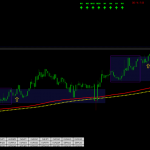The full disclaimer here is that after-hours trading isn’t for everyone. If you’re just starting as a stock trader, you must know when to trade. With that, trading exchanges are similar to other marketplaces. They open and close at specific times.
If the market has regular business hours, what’s after-hours trading about? This option lets you trade outside of the normal hours of 9:30 AM to 4 PM (EST).
Typically, trading is available before the markets open, which is called premarket. However, trading after the close of the market is called post-market.
In a sense, after-hours trading is a combination of both of those. It includes everything that happens in that short period of time before the markets open and right after closing.
Table of Contents
Premarket and Post-Market Trading
Premarket and after-hours trading are primarily the same thing because they include extended hours for trading. However, you can’t trade during those sessions like you might during the normal trading day. The decisions you make vary based on whether you’re trading in the evening or morning.
Most of the time, premarket trading focuses on data that came out overnight. Traders have to get up very early to learn fresh developments, read reports, and choose when to pounce.
After-hours trading requires you to capitalize on the stock price movements each day. However, it also includes traders who move on anticipated economic indicators and news the next morning.
If the goal is to hold a stock overnight, you must research options. You need solid indicators to show that the stock market should perform as you want it to, whether you’re shorting or going long.
Is Late-Day Trading Similar to After-Hours Trading?
Late-day trading requires you to sell/buy shares before the normal market closes that day. The stock market is often more volatile later than during the after-hours market. That’s when investors and traders spot stocks to buy, close out positions, and decide whether or not to hold overnight. There’s often a rush of quick decisions before the time runs short.
Then, there’s often a cool-off period where the exchange closes. Investors head home, and the volatility drops sharply. Still, some people prefer to play and do after-hours trading.
If you’ve heard of late trading mutual funds, this is illegal. Late trading often refers to hedge funds that report sales and mutual-fund buys during regular market hours that actually occur after hours.
The mutual fund prices get set each day and don’t change throughout. It’s easy to see how scammers might try to benefit and take advantage of the previous day’s pricing.
How Does After-hours Trading Work?
You know that after-hours trading occurs outside of the regular market hours, but how? It’s only available because of improved technology.
All of the orders are run through ECNs (Electronic Communication Networks). These computers match buy/sell orders if they’re the same price.
To execute them, the order prices have to be limit orders. You can’t choose the market order because it’s closed. Therefore, you have to specify that information on Arca or NYSE, an electronic securities exchange. That means you also require the right order type.
What’s Tradeable?
Ultimately, after-hours trading work differently based on the broker. They set their rules about what trade types you can make, what constitutes an after-hours trade, and whether extra fees are involved.
You can buy, sell, and short your stocks similarly to how you do during the day. Just remember to be more careful.
The Schedule
Most major US stock exchanges are open from 9:30 AM to 4 PM (EST). They’re available Monday through Friday, with the exception of federal holidays.
Typically, premarket trading starts around 4 AM EST and goes until the market officially opens. With that, after-hours trading goes from 4:30 PM to 8 PM (EST).
There’s nothing wrong with after-hours trading, but you must understand the drawbacks and rules.
Who Is Allowed to Trade After-Hours?
In the past, after-hours trading was only available to institutional investors. Because of computerized executions, though, it’s available to everyday retail traders. As long as your broker allows it, you can trade after-hours.
However, some brokers don’t allow this or could charge extra fees for the service. It’s often harder to execute trades after-hours because there’s less liquidity. Sometimes, orders aren’t processed at all.
Advantages of After-hours Trading
In some cases, after-hours trading can provide more opportunities. If you buy stocks outside of normal trading hours, you can get in early on the swings. However, it’s riskier.
When do these trades fare best? Earnings winners is one example. If you decide to play the risk market, you must do your research. Look for catalysts and keep up with the news.
Aside from an earnings report, a catalyst could be new legislation, global news, or new product launches. Anything sparking a big move in stock is a catalyst.
Drawbacks of After-hours Trading
Primarily, after-hours trading is risky, especially for those who do no research. It’s important to take in all the information, but don’t act on every media report you find. Fly-high stocks can fail quickly, but earnings calls can swing either way, too.
With that, there’s low liquidity, so you may not have the option to close out positions fast. There just might not be sellers and buyers available.
Plus, after-hours trading quotes are highly limited. The bid-ask spreads are often wider during these times. Limit orders are the only options accepted during this time. Therefore, you might pay more or sell it for less than you wanted.
Conclusion
If you are up for a challenge and consider yourself to be a seasoned trader, after-hours trading might be what you want. There are potentially excellent benefits to investors who participate. However, the risks are also high. It’s important to be mindful of that when participating in after-hours trading efforts.
WeInvests is a financial portal-based research agency. We do our utmost best to offer reliable and unbiased information about crypto, finance, trading and stocks. However, we do not offer financial advice and users should always carry out their own research.
Read More







